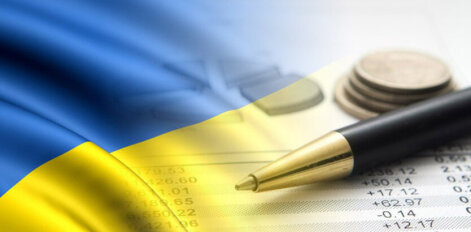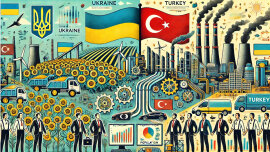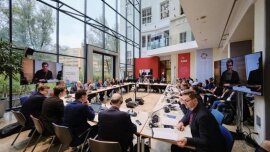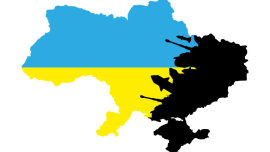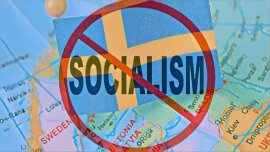Ukraine enters the fourth month of the war with an active public debate on the postwar reconstruction of its economy. This debate features a lot of interesting and sound ideas. Still, none of these visions seem comprehensive so far. They are lacking a number of important elements.
Three cornerstone questions need to be answered before any reconstruction plans are made:
Question 1. What will Ukraine-Russia relations be like after the war? In other words, how will the war end? The answer to this question defines the best possible ultimate configuration of Ukraine’s economic system. This formula contains many unknown variables, and Ukraine needs to find a common denominator for all of them. The only element that everybody understands is that Russia is Ukraine’s enemy. This statement will remain relevant for years or decades to come. This means that there should be a serious security component in the economy.
There is far less clarity on the other parameters. Unless the ongoing war ends with full liberation of Ukraine’s territory, including Crimea, a new round of it is inevitable in the near future. Ukraine will have to prepare for it, placing an emphasis on the development of its military industry, building the relevant infrastructure, preparing the population – for example, offering dual-purpose professional training – and more.
If the war leads to full liberation of Ukraine’s territory – hopefully, this is the basic scenario – Russia will look for a revanche. With a strong economy, Russia will be a permanent source of a threat of revanche. If that is the case, Ukraine will have to make an economic leap with a moderate emphasis on security so that it accomplishes economic advantage over Russia in the mid-term prospect. This will prevent an invasion from Russia.
If Russia falls apart as a result of the war, parts of it will likely end up under China’s influence while other parts will end up in a governance vacuum or total chaos. In that scenario, Ukraine will have to build its economy so that it is prepared for fight against terrorism and a civilizational clash with China.
Each of these scenarios calls for a serious military or security component. On other segments of the economy, many questions will remain unanswered until the war ends.
Question 2. How will the global changes caused by the war affect the Ukrainian economy? The Russia-Ukraine war launched an avalanche of trade, economic, security and geopolitical processes that are seriously shifting the global status quo. For now, however, the impression is that the world does not yet understand fully what these changes are and where they will lead. One thing is evident: the result will be a new balance that will define global trade and economic trends. These trends will have a serious impact on Ukraine’s economic system. Therefore, any vision of the postwar reconstruction of Ukraine’s economy will be adjusted as this balance emerges.
The world might have to go through a deep economic crisis before a fairly stable vision of the future emerges. In that scenario, the reconstruction of Ukraine will be less intense than it could be. If, despite global inflation, developed economies manage to keep the current employment rate, Ukraine’s economy could become a manufacturing platform where the technology that does not fit in the rich countries applies – this happened in South Korea, China, Mexico and others at one point.
One thing we have realized by now is that Russia is a civilizational rival of the West. Russia has created a lot of global-scale problems and questioned the current global order. This is a fact that is evident to the world. So the West will act against Russia regardless of when these problems will be solved. This means that the isolation of Russia will last long enough, for years or decades. In this time, international economic relations will change profoundly, and so will the trade routes reflecting them – in reality, it will be very difficult to return trade and money flows to the old channels after 2-3 years like now. In that scenario, Ukraine’s economy will become a frontier economy for the West. It will thus end up with huge opportunities thanks to its location.
Question 3. Which place will Ukraine’s economy have in the trends of the future that emerged before the war? While Ukraine is fighting the war, the Fourth Industrial Revolution continues. Some segments of the economy in the world might have changed profoundly by the time the war is over and the real reconstruction of Ukraine begins. Any reconstruction must take into account the country’s needs for the next decades: nobody builds looking into the past, only into the future.
A great part of the economic facilities destroyed by the war were built in Ukraine under the Soviet Union to serve the needs of the soviet economy. During independence, these factories worked for the CIS markets by inertia and many failed to carve out a niche elsewhere. Most of their prewar markets are probably lost for good. As a result, it makes no sense to rebuild the destroyed factories oriented at these markets. In over 30 years after the collapse of the Soviet Union, the needs of Ukraine’s economy will be completely different from the soviet time. Therefore, the term reconstruction does not necessarily reflect what Ukraine needs. It will rather be the construction of a new economy taking into account new future needs of Ukraine and the world. In order to accomplish a comprehensive vision of the postwar reconstruction, Ukraine has to decide what exactly it needs in order to ensure a decent life for Ukrainians instead of looking at what it had before the war.
The reconstruction of Ukraine’s economy will rely on limited resources. Ukrainians will want it to be fast. This means that Ukrainians should shape a clear vision of this reconstruction with well-thought priority and order of steps before it even begins. As part of this, it is important to answer the questions listed here from the perspective of different scenarios and design the reconstruction in the way to accomplish a common denominator that leads to the best possible structure of the economy and takes into account different scenarios.
This means that we can dream and express various wishes and visions of reconstruction. In the end, however, Ukrainian society should end up with a clear, structured and consistent plan. In my view, it should have the following components:
1. Institutionalizing the changes that have taken place throughout the war in the Ukrainian mentality. The article Reform of Mentality describes this in more detail. This is an important, and possibly the only prevention against turning the postwar reconstruction into a farce and fraud of a global scale.
Unfortunately, quantity rather than quality elements dominate the public debate about reconstruction of Ukraine today. This topic sparks up dollar signs in the eyes of many top officials. Officials get jittery from realizing the scale of possible profits. They compete in naming a bigger estimate of Ukraine’s losses from the war. For the Ukrainian people, every dollar given for reconstruction is washed with the blood of its sons and daughters. For many officials, this is trivial cynical prey. They are all preparing to administer billions. This is why nobody is going to fire Hetmantsev for failures in economic policy. Quite on the contrary, he is appointed Secretary for the Recovery of the Economy. Some are fighting and dying while others are earning wealth. This often happens in war. But if this happens this time, the recovery will strengthen a group of officials without principles and oligarchs, not Ukraine. That’s when we will cut off our way to implementing all prospects described above. To avoid that, we need to not just take corruption under control, but to entrust a lion’s share of reconstruction with the people who have proven their prudence with consistent work before the war or with active work for victory.
2. Doing structural reforms. Transformation should be guided by the new mental image of the Ukrainian people and focus on the institutions that made Ukraine a weak state until now. These include courts, law enforcement agencies, tax administration, customs, antimonopoly and anticorruption work, state governance and more. Over the past eight years, Ukrainian society has processed this list and the system of actions that need to be taken in order to strengthen the state. Now, we just need to place prudent, professional and patriotic people in key positions who will put the results of all this work in action and create all necessary mechanisms for this.
3. Maximum distribution in the economy. The war has shown that concentrating major economic assets and activities in one place makes the economy and the country excessively and unjustifiably more vulnerable. Therefore, Ukraine has to drop the idea of building or rebuilding monotown factories, big power plants and petroleum storages. Hit by just one missile, it stops the entire cities or regions. Instead, Ukraine should develop the economy based on human capital as it is very mobile, SMEs as they create the system of competition where one element that drops out is not critical, renewable energy as solar, wind and other small power plants are distributed in space, distributed logistic systems, small and preferably autonomous towns with comfortable life to avoid making big cities the key targets for the economy – especially as takeover of these cities by the enemy leads to a threat of capitulation for the country. The idea of distribution emerged before the war following the concept of a mosquito fleet that would meet Ukraine’s needs as much as possible. Now, this concept should be expanded to the entire economic system.
4. Comprehensive support for SMEs. Competitive segments filled with goods and services from many enterprises, mostly small and mid-sized, proved the most resilient against the impact of war. This means that SMEs should become the basis of Ukraine’s postwar economy. This reflects the mentality of Ukrainians as individual owners capable of taking responsibility, taking decisions and solving problems. Also, this diminishes risks for the entire economy. To reach that goal, Ukraine needs to not just change government policy on SMEs. The state must stop being the behemoth that constantly wants “to pluck a duck,” as Hetmantsev once put it notoriously, trying to crush them with awkward movements and disregards their lamenting. The law enforcement system should stop being a barrier created in the soviet mold, that can only be rivaled by those who have sufficient resources to pay lawyers and bribe officials – meaning big businesses mostly owned by oligarchs.
Agribusinesses illustrate the importance of SMEs. During the war, major agricultural holdings with concentrated logistics faced critical problems, including the loss of produce as a result of destruction, the enemy stealing crops and more. If Ukraine relied on developing small farms with well-developed and well distributed production of niche goods, the situation would be far less problematic. That is the accent that must be made in the development of agribusiness in the postwar economy.
5. Climate neutrality in energy. On the one hand, Ukrainian pipelines have lost their primary function for good – the function of transporting fuels from Russia to Europe. On the other hand, moving to independence from Russian oil, gas and coal, the EU will speed up the reform of its energy sector. The principles of this transformation were defined two-three years ago in strategic documents, including the EU Hydrogen Strategy. It mentions Ukraine three times as the key potential supplier of the green hydrogen to Europe from beyond the EU. Therefore, Ukraine’s gas transit system should be adjusted to carry hydrogen to the EU. This creates huge opportunities for developing climate-neutral energy for Ukraine. Ukraine needs to create economic mechanisms that will allow it to fulfill this potential as soon as possible.
6. All of Ukraine’s current allies have to be involved in physical reconstruction. This includes several points. Firstly, the output of Ukraine’s construction industry was US $25bn before the war. Today, according to the most conservative and non-final estimates by the Kyiv School of Economics (KSE), the documented losses caused by the war are nearing US $100bn. This means that it will take at least four years to rebuild infrastructure even if everyone involved in Ukraine’s construction industry shifts to that. In reality, the more time takes the reconstruction the bigger corruption risk it involves. Is anyone happy about such a timeframe? We can assume that hundreds of thousands of volunteers will join the reconstruction after losing everything in the war. Then the question will emerge of quality control that should not be overlooked. Ukrainian construction industry can have problems with that. Secondly, the construction will need to be different after the war, far more resilient, given the security element of the economy mentioned above. The Ukrainian construction industry will not manage that on their own, at least within a short timeframe.
Thirdly, this construction will need to be future-oriented. Ukraine should become a platform for innovative, autonomous, ecosystem-focused techniques for residential and economic construction. At the same time, these objects should become a monument to the victory that will eternalize the feat of the Ukrainian people and show to the world that suffering always leads to reward. Only companies from developed countries can handle this challenge thanks to their experience of doing similar things at home. Therefore, the idea that it is Ukrainians only who should shape or control the reconstruction of the Ukrainian economy is counterproductive. After all, all of Ukraine’s allies have made a huge contribution to its victory. We should offer them something in return.
7. Building new transport infrastructure under new geopolitical reality. Firstly, Ukraine’s movement to the EU and its market is irreversible. This means constant increase of trade with the EU that will require transport, infrastructure and logistics. Therefore, Ukraine needs to develop land transport corridors to the EU not just because the sea is blocked for it now, but because this integration will allow it to increase its GDP to severalfold higher than the prewar rate and will require sufficient capacity of the transportation system.
Secondly, Ukraine will build ultramodern cities to replace the destroyed ones. These will combine the living memories of the war, Ukraine’s feats and involvement of Ukraine’s allies, as well as the proper verbal content that will communicate all this. In sum, this will make Ukraine a unique and appealing destination for tourism. The Russia-Ukraine war might be the last great war in the world that will make it clear for good that solving issues with military means is unacceptable, unprofitable and unreasonable. This is a clear opportunity for developing tourism. Again, bringing this to life calls for the development of proper infrastructure.
Thirdly, if Russia remains isolated for years, many trade flows – including from China and other Asian countries to Europe – will shift more southward than before the war. Some may go through Ukraine as long as Ukraine manages to provide the proper quality of logistics and transport infrastructure.
Fourthly, infrastructure projects should take into account the military component for as long as the least threat of another war with Russia or other serious security challenges remain relevant. This results in additional criteria for such construction.
8. Focus on developing human capital and preparedness for self-defence in education. Some industries, such as IT, have proven very resilient against the impact of the war. Other industries have crumbled resulting in huge unemployment and multiple by-effects. Ukraine should draw conclusions from this and include them in the structural change of its economy. It should incentivize the development of the industries that rely on human capital to the greatest extent possible. This calls for good education. The problem is that the Ukrainian higher education lagged behind many universities in Poland and elsewhere. Ukraine had several strong universities that have lately been included in global rating lists, but the overall system was quite weak. This needs to be fixed. One solution is to stimulate the development of competitive universities. The war with its forced remote learning was a serious challenge for Ukraine’s education system and revealed its weaknesses. They can be analyzed to draw proper conclusions and create the basis for a quality transformation of higher education.
If Ukraine becomes a full-fledged partner of developed countries in economic, security, military and technological terms, opportunities for international cooperation will emerge permanently. This cooperation is impossible without the knowledge of foreign languages which Ukraine’s education system must ensure. The current historical stage creates demand for niche expertise. For example, Ukraine needs to create a system to provide regular training of its people in a second military capacity, provide quality training to the military, health personnel, supply workers, drivers and more. So that everyone knows what they should do and where they should go in case of a new war rather than spend days queuing for enrollment at recruitment stations.
Not losing human capital is as important as developing it. Millions of labor migrants who left Ukraine before the war and millions of refugees who are victims of the war should feel and understand that coming back home will give them the best possible prospects. Therefore, the reconstruction of Ukraine should center around its people, citizens. Otherwise, there may be no one to reconstruct the country for.
9. Developing the military industry. The war turned Ukrainians into expert users of various armaments. This will lead to many know-hows and improvements with time. Undoubtedly, Ukraine will be able to set up the production of much of what it is using now after the war. But another aspect exists in this. Ukraine’s Western partners have supplied a lot of weapons to Ukraine and will keep supplying them. They will have to replace it with something. Ukraine can be a candidate for transferring military technology and locating the production on its territory to fill the military equipment of European countries in line with NATO standards. Since Ukraine’s security has essentially become the security of the West’s eastern flank, the US and EU might actually support this idea.
10. Integration into European and American production chains. This contains at least two scenarios that create opportunities for Ukraine. Firstly, if the developed economies avoid a deep decline, they will soon face the question of where to move the less efficient production facilities that they will have to replace with new technology. The unemployment rate was 2.6% in Japan, 2.7% in South Korea, 3.6% in the US and 3.7% in the UK in April. These are very low numbers, close to the record low. Developed economies lack human resources to accomplish a transition to the next phase. Ukraine has these resources. The war has demonstrated that Ukraine deserves to receive the respective technology. As a result, foreign investors might be ready to invest billions into Ukraine’s economy. The main thing is to make sure that Ukrainians do not undermine this readiness with their destructive activities.
Secondly, if China sides with Russia in this war – which is unlikely as described in Paper Tiger – this could force many transnational companies with headquarters in Europe and North America to transfer their production from China to somewhere closer to the biggest European market in the world. In that scenario, Ukraine will be the key candidate for the lion’s share of this.
Some of these points can and have to be implemented now, without waiting for the war to end. The world still remembers Ukraine as a country that lags behind and struggles to implement the necessary reforms. After the war, it will therefore be cautious about close cooperation with Ukraine. In order to change that perception completely, Ukraine should prove that it has changed. And do its homework – create one of the best business environments – voluntarily, without the money of international financial organizations. In that case, the opportunities described above will turn from potential to real. Using them will help Ukraine not just rebuild its economy after the wartime destruction, but to build an economic system that Ukrainians can only dream of now.
